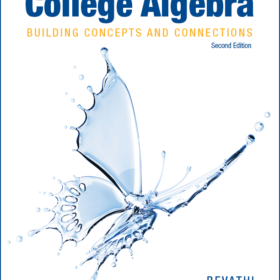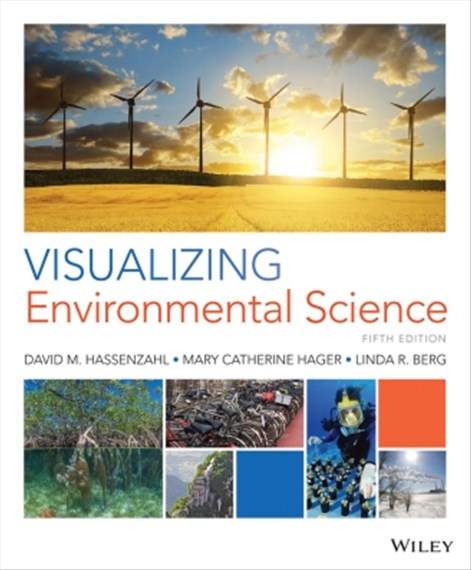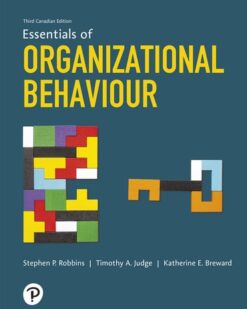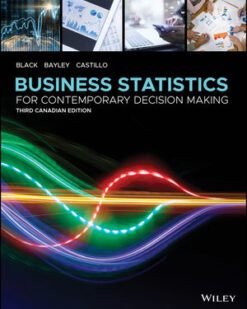Description
TABLE OF CONTENTS
1 The Environmental Challenges We Face 2
Human Impacts on the Environment 4
Envirodiscovery 1.1: Green Roofs 8
Sustainability and the Environment 12
Environmental Science 16
How We Handle Environmental Problems 20
Envirodiscovery 1.2: Getting Past NIMBY 22
Case Study 1.1: The New Orleans Disaster 23
2 Sustainability and Human Values 26
Human Use of the Earth 28
Human Values and Environmental Problems 31
Environmental Justice 35
An Overall Plan for Sustainable Living 36
Case Study 2.1: The Loess Plateau in China 44
3 Environmental History, Politics, and Economics 48
Conservation and Preservation of Resources 50
Environmental History 51
Envirodiscovery 3.1: Environmental Literacy 58
Environmental Legislation 59
Environmental Economics 62
Case Study 3.1: Tradable Permits and Acid Rain 68
4 Risk Analysis and Environmental Health Hazards 72
A Perspective on Risks 74
Environmental Health Hazards 77
Movement and Fate of Toxicants 81
Determining Health Effects of Pollutants 85
Envirodiscovery 4.1: Smoking: A Significant Risk 88
The Precautionary Principle 90
Case Study 4.1: Endocrine Disrupters 92
5 How Ecosystems Work 96
What Is Ecology? 98
The Flow of Energy Through Ecosystems 100
The Cycling of Matter in Ecosystems 106
Ecological Niches 113
What a Scientist Sees 5.1: Resource Partitioning 115
Interactions Among Organisms 116
Envirodiscovery 5.1: Bee Colonies Under Threat 118
Case Study 5.1: Global Climate Change: How Does It Affect the Carbon Cycle? 122
6 Ecosystems and Evolution 126
Factors That Shape Biomes 128
Describing Earth’s Major Biomes 132
Envirodiscovery 6.1: Using Goats to Fight Fires 138
Aquatic Ecosystems 142
What a Scientist Sees 6.1: Zonation in a Large Lake 143
Population Responses to Changing Conditions over Time: Evolution 147
Community Responses to Changing Conditions over Time: Succession 151
Case Study 6.1: Wildfires 154
7 Human Population Change and the Environment 158
Population Ecology 160
Human Population Patterns 165
Demographics of Countries 168
Stabilizing World Population 173
Envirodiscovery 7.1: Microcredit Programs 176
What a Scientist Sees 7.1: Education and Fertility 177
Population and Urbanization 178
Case Study 7.1: Urban Planning in Curitiba, Brazil 184
8 Air and Air Pollution 188
The Atmosphere 190
Types and Sources of Air Pollution 194
What a Scientist Sees 8.1: Air Pollution from Volcanoes 197
Effects of Air Pollution 199
Envirodiscovery 8.1: Air Pollution May Affect Precipitation 201
Controlling Air Pollutants 204
Indoor Air Pollution 207
Case Study 8.1: Curbing Air Pollution in Chattanooga 210
9 Global Atmospheric Changes 214
The Atmosphere and Climate 216
What a Scientist Sees 9.1: Rain Shadow 219
Global Climate Change 220
Ozone Depletion in the Stratosphere 229
Envirodiscovery 9.1: Links Between Climate and Atmospheric Change 231
Acid Deposition 232
Case Study 9.1: International Implications of Global Climate Change 236
10 Freshwater Resources and Water Pollution 240
The Importance of Water 242
Water Resource Problems 245
Water Management 252
Water Pollution 256
What a Scientist Sees 10.1: Oligotrophic and Eutrophic Lakes 257
Improving Water Quality 262
Case Study 10.1: China’s Three Gorges Dam 267
11 The Ocean and Fisheries 270
The Global Ocean 272
Major Ocean Life Zones 276
Envirodiscovery 11.1: Otters in Trouble 280
Human Impacts on the Ocean 282
What a Scientist Sees 11.1: Modern Commercial Fishing Methods 284
What a Scientist Sees 11.2: Ocean Warming and Coral Bleaching 287
Addressing Ocean Problems 289
Case Study 11.1: The Dead Zone in the Gulf of Mexico 291
12 Mineral and Soil Resources 294
Plate Tectonics and the Rock Cycle 296
Economic Geology: Useful Minerals 300
Environmental Implications of Mineral Use 304
Envirodiscovery 12.1: Not-So-Precious Gold 305
Soil Properties and Processes 307
What a Scientist Sees 12.1: Soil Profile 308
Soil Problems and Conservation 310
Case Study 12.1: Coping with “Conflict Minerals” 315
13 Land Resources 318
Land Use in the United States 320
Forests and Forest Management 322
Envirodiscovery 13.1: Ecologically Certified Wood 324
What a Scientist Sees 13.1: Harvesting Trees 326
Deforestation 327
Rangelands 331
National Parks and Wilderness Areas 334
Conservation of Land Resources 339
Case Study 13.1: The Tongass Debate over Clear-Cutting 342
14 Agriculture and Food Resources 346
World Food Problems 348
The Principal Types of Agriculture 351
Challenges of Producing More Crops and Livestock 353
Solutions to Agricultural Problems 358
Controlling Agricultural Pests 362
What a Scientist Sees 14.1: Pesticide Use and New Pest Species 364
Case Study 14.1: Organic Agriculture 366
15 Biodiversity and Conservation 370
Species Richness and Biological Diversity 372
Endangered and Extinct Species 376
Envirodiscovery 15.1: Is Your Coffee Bird Friendly®? 378
What a Scientist Sees 15.1: Where Is Declining Biological Diversity the Most Serious? 379
Conservation Biology 384
Conservation Policies and Laws 388
Case Study 15.1: The Challenges of Protecting Rare Species 391
16 Solid and Hazardous Waste 394
Solid Waste 396
What a Scientist Sees 16.1: Sanitary Landfills 399
Envirodiscovery 16.1: The U.S.–China Recycling Connection 402
Reducing Solid Waste 402
Hazardous Waste 407
Envirodiscovery 16.2: Handling Nanotechnology Safely 408
Managing Hazardous Waste 410
Case Study 16.1: High-Tech Waste 413
17 Nonrenewable Energy Resources 416
Energy Consumption 418
Coal 419
Oil and Natural Gas 421
Nuclear Energy 428
Envirodiscovery 17.1: A Nuclear Waste Nightmare 435
What a Scientist Sees 17.1: Yucca Mountain 436
Case Study 17.1: The Arctic National Wildlife Refuge 437
18 Renewable Energy Resources 440
Direct Solar Energy 442
What a Scientist Sees 18.1: Photovoltaic Cells 444
Indirect Solar Energy 448
Other Renewable Energy Sources 454
Energy Solutions: Conservation and Efficiency 456
Envirodiscovery 18.1: Deep Energy Retrofits 456
Case Study 18.1: Green Architecture 461
Graphing Appendix 464
Glossary 473
Index 478






